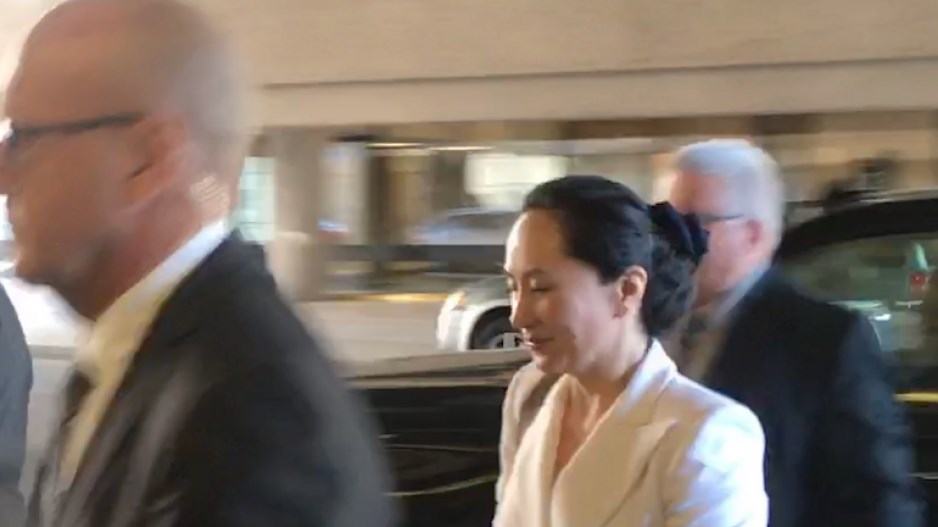The Meng Wanzhou extradition hearings resumed today in Vancouver, with Crown prosecutors firing back at the Huawei Technologies CFO’s accusations that officials violated her charter rights during her 2018 arrest.
Crown attorney Robert Frater took the argument to the Meng defence this morning, noting that the defence’s 30-plus instances of what it calls “abuse of process” – ranging from the Canada Border Services Agency taking Meng’s electronic devices to the lack of notes on the arrest procedure from both the CBSA and the RCMP – were all proper and reasonable procedure for officers dealing with “novel” circumstances.
Ultimately, Frater said, none of the challenges raised by Meng's defence raised a "discernable pattern of prejudice" against the Chinese tech executive in the extradition process. The core alleged crime that Meng is accused of - fraud by misrepresenting facts about business in Iran to HSBC - requires a proper trial in the United States to determine its merits, the Crown lawyer added.
"What the case law tells us is that the offence of fraud is intended to encourage honesty in commercial dealings," Frater said. "Our position is the actions of the applicant here [Meng] are the very sort of actions intended to be squarely within the core of the offence of fraud.
"Now we grant that a bank may not be as sympathetic a victim as vulnerable elderly people [in a case precedent]," he added. "But that does make the offence less serious."
The only possible issue that may be problematic, Frater said, was the fact that the CBSA mistakenly passed Meng’s electronic passcodes – collected during border entry exams – to the RCMP along with other evidence. But Frater added that the instance a) was an unintentional error of the CBSA officer who collected the evidence and b) did not amount to prejudice in the case because the passcodes did not end up being used, thus rendering no harm to the fairness of the extradition proceedings.
Frater also pointed out the the Meng defence appears to change its position during the extradition proceedings – from initial allegations that there was an U.S.-led covert operation to arrest Meng and collect evidence for an eventual trial south of the border to one where the RCMP/CBSA violated Meng’s charter rights during arrest without a U.S.-orchestrated plan.
“I understand why they would choose to change their language, because they were not close to proving any covert criminal investigation,” Frater said. “But if the ulterior motive for the RCMP and CBSA conduct was not to aid the United States... what ulterior motives could there possibly be?”
Frater accused the Meng defence of initially starting with the conspiracy, convert operations theory – “a theory looking for evidence” – to a situation where the evidence that was discovered were pieced together to support another theory. The accumulated facts, Frater said, does not amount anywhere close to requiring a stay of extradition.
The Crown lawyer also took issue with the defence’s claims that U.S. authorities and Canadian officials showed no contrition in the way they conducted the carrying-out of the Meng case, saying “there is not need for contrition because there is no misconduct.”
"Our position is... there is no misconduct to accumulate," Frater said "And none of the impugned conduct by itself or added to any other conduct would justify a stay."
Earlier in the day, Frater also addressed defence claims that the comments made by former U.S. President Donald Trump shortly after Meng’s arrest – that he was considering intervening in the case if it benefited U.S-China trade negotiations – cast a pall over the fairness of the proceedings.
Frater noted that Trump did not actually use the words “ransom” or “bargaining chip,” adding that his stance has been repeatedly refuted by other U.S. senior officials from both the former and current U.S. secretary of state, U.S. trade representative Robert Lighthizer and current U.S. President Joe Biden.
“Words do not stand alone,” Frater said. “We agree with our friends [the Meng defence] that words have power, but your job [that of presiding judge, B.C. Supreme Court associate chief justice Heather Holmes] is to look at the actual words.
“If the defence felt that the words [of Trump] put a shroud over the extradition proceedings, they should have asked the court for remedy immediately,” Frater concluded, noting that the Meng defence pursued other arguments for more than a year (such as double criminality) before circling back to Trump’s comments as an abuse of process.
In an afternoon retort, Meng lawyer Tony Paisana replied that the defence did broach the subject of Trump's comments and their impact on the proceedings in case-management and the Attorney General of Canada as early as January 2019. Paisana further noted that in follow-up case-management hearings that the Meng defence said - in the presence of Crown counsel - that it planned to bring up Trump's comments after other arguments they felt should be prioritized were completed first.
At that time, Paisana said, the Crown offered no objections.
"They never once said, 'By seeking this position, Ms. Meng should be disentitled to this argument,' as the position they have taken today," Paisana said, asking judge Heather Holmes to throw out Frater's submissions on that point.
Paisana also fired back at Frater, saying the defence never took the position that its second-branch of abuse-of-process allegations - that of the CBSA and RCMP misconducts when arresting Meng - were dependent on a conspiracy or a covert plan to trap Meng at YVR on Dec. 1, 2018.
The hearings continue this week and next, with final arguments from the Crown scheduled for tomorrow morning, followed by Meng defence's final retort on Friday. The Crown will then get one last chance to respond early next week on either Tuesday or Wednesday.




